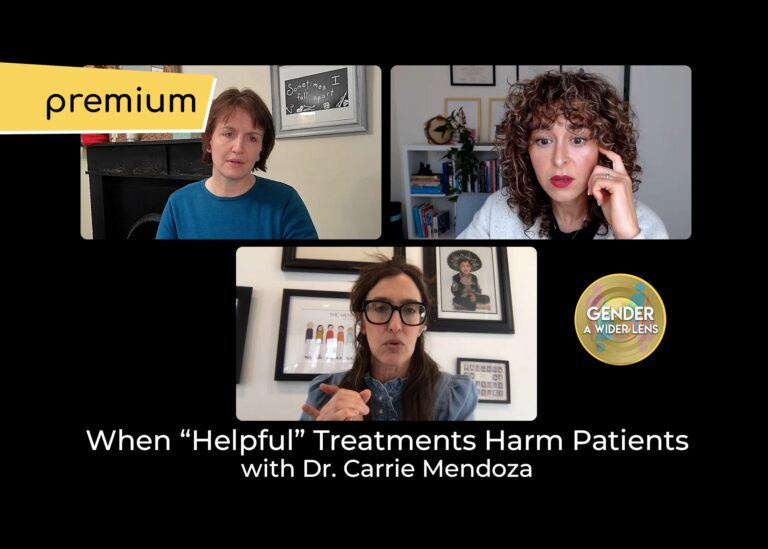Healthcare

We wish to support clinicians by providing a deeper level of knowledge about gender issues. On this page, you will find useful resources, links to helpful organisations, and tailored guidance for healthcare workers. We believe this will assist you in developing a better understanding of what gender means in today’s context.
As the therapist Sasha Ayad says, “no-one is just a walking gender identity”.
Yet many children and young adults are investing huge amounts of stock in their transgender or non-binary identities. The stakes feel high: often, medical transition seems to become a panacea, and fixation and hyper-rumination ensue.
Many clinicians are deeply concerned that these vulnerable young people are being funnelled towards a singular explanation for their distress. In reality, life is more complex. Comorbidities such as ASD, ADHD, eating disorders, depression and anxiety each deserve their own analysis: so do trauma, bullying and internet use.
Around the world, countries are reappraising how they deal with gender-questioning youth. As jurisdictions revisit their treatment protocols, it’s becoming clear that the new cohort of trans-identified adolescents and young adults is little understood, leaving those who work in healthcare in a precarious position.
Brief Guidance
Our Brief Guidance for clinicians has been drawn up in consultation with a range of professional healthcare workers, including therapists, doctors and mental health workers, with particular input from those who work with gender-questioning kids.
We believe that gender-related healthcare is often put in its own silo, as though it were unrelated to other health matters. We also believe this to be a mistake: clinicians should not be frightened of gender issues, and should feel able to deal with them as part of their normal range of practice. With that in mind, we hope that our guidance helps to demystify some of the complex aspects of transgender identification.
Stats for Gender
We created our sister website, Stats for Gender, to improve the accessibility of high-quality, peer-reviewed data pertaining to trans issues.
Each topic is easily displayed with a simple click: from demographics and DSDs to comorbidities and neurodivergence.
Stats for Gender gives you findings from the latest cutting-edge research, ensuring that you are up to date with the science as it stands.
Ever wondered what the pioneers of gender healthcare really think?
Genspect is proud to sponsor “Gender: A Wider Lens”, the podcast that’s leading the world towards a more expansive and thoughtful view of gender issues. The Wider Lens’ recent “Pioneers” series gathers in one place some of the most influential figures from transgender medicine – and asks them the tough questions you really want answered.
Listen to each episode using the audio player below, or scroll down to access all the “Gender: A Wider Lens” episodes.

Therapists Stella O’Malley and Sasha Ayad explore diverse perspectives through a psychological lens, fostering open dialogue on gender identity, transition, and the transgender umbrella. Their work with gender dysphoric clients and unique experiences yield an informed outlook delving into gender’s psychological nuances. Interviews with clinicians, academics, transgender individuals, parents, detransitioners, and others touched by gender provide varied insights and intimate inquiry into the taboo yet relevant topic.
This is a free preview of a paid episode. To hear more, visit www.widerlenspod.com
As the medical establishment continues to extract valuable lessons in the aftermath of the opioid crisis, the medical use of cannabis has become legalized in many US states. But is it an appropriate substitute for opioids? With a lack of scientific evidence supporting the efficacy of cannabis compared to traditional over-the-counter pain relievers (like Motrin), do we fully understand the impact that elevated THC levels can have in patients long term? The push for medical marijuana parallels the opioid crisis, with both instances involving the broad application of treatments without sufficient consideration of potential harms — sound familiar?
“So you’ve created a whole new set of adverse effects that of course they didn’t think of…it just got so broadly applied that now they’ve caught a giant mass of young people that are exposed to interventions that aren’t appropriate or they’re ignoring adverse effects”
In this bonus episode for premium subscribers, Carrie highlights concerns about the medicalization of ‘spiritual’ problems and the over reliance on medication as a solution.
“My job isn’t to practice medicine based on what message you want to hear, it’s based on diagnosing your problem and treating it.”
She also discusses her shift in focus towards gender-related issues, particularly after encountering cases of young individuals undergoing drastic medical interventions.
Watch our full length episode with Dr. Carrie Mendoza:
https://www.widerlenspod.com/p/episode-159
To listen to our premium content in your favorite podcast app click here for Substack instructions on setting up a private feed.

The healthcare industry has failed young people. But there’s a way to make amends
Growing numbers of trans people are choosing to detransition. Yet more are questioning the level of healthcare they received, and while they may not wish to re-enter the same medical system that let them down, they are certainly disenchanted by their own transition.
On March 12th, 2022, Genspect hosted a Detrans Awareness Day webinar, where detransitioners could speak about their own experiences, in their own words. You can watch the entire event here:
Hearing these testimonies, we decided to prioritise those who have been so badly let down by the healthcare system. So we launched Beyond Trans, a service designed to meet the needs of this under-resourced community.
If you would like to repair some of the damage that the modern healthcare industry has done to young people questioning their gender, you can get involved. We’ll be rolling out initiatives to provide support to detransitioners and others negatively affected by medical transition.
We’d like as many therapists and clinicians as possible to be involved.
Listening to parents’ voices
Most parents are loving and engaged people. They want the best for their kids – not just today, or next year, but for the rest of their lives. When they raise concerns about medicalisation, those concerns should be given a fair hearing.
We do not believe that parents should be cut out of decision-making processes regarding their own children, except in the mercifully small number of cases where state agencies have had to intervene to protect children from physical neglect and abuse.
We believe that parents are wrongly being sidelined in their own kids’ lives, and that clinicians should be sure to include them wherever possible. Please take a moment to look over the resources below, which will give you a flavour of the loving and engaged parents we represent.
Become part of our movement
In many different countries, therapists, doctors and mental health practitioners are coming to realise that there’s so much more to learn about transgender identities – and that there’s much to be said for joining forces with other professionals in similar positions.
By joining us, you’ll receive email updates, and advance notice of any upcoming events. You’ll also have the chance to subscribe to our online Community Forum, where you can meet people from all walks of life who share your outlook.
Working with other organisations from healthcare and beyond, we are building a global movement to improve the quality of treatment for young people who are questioning their gender. We’d love you to be part of it.
